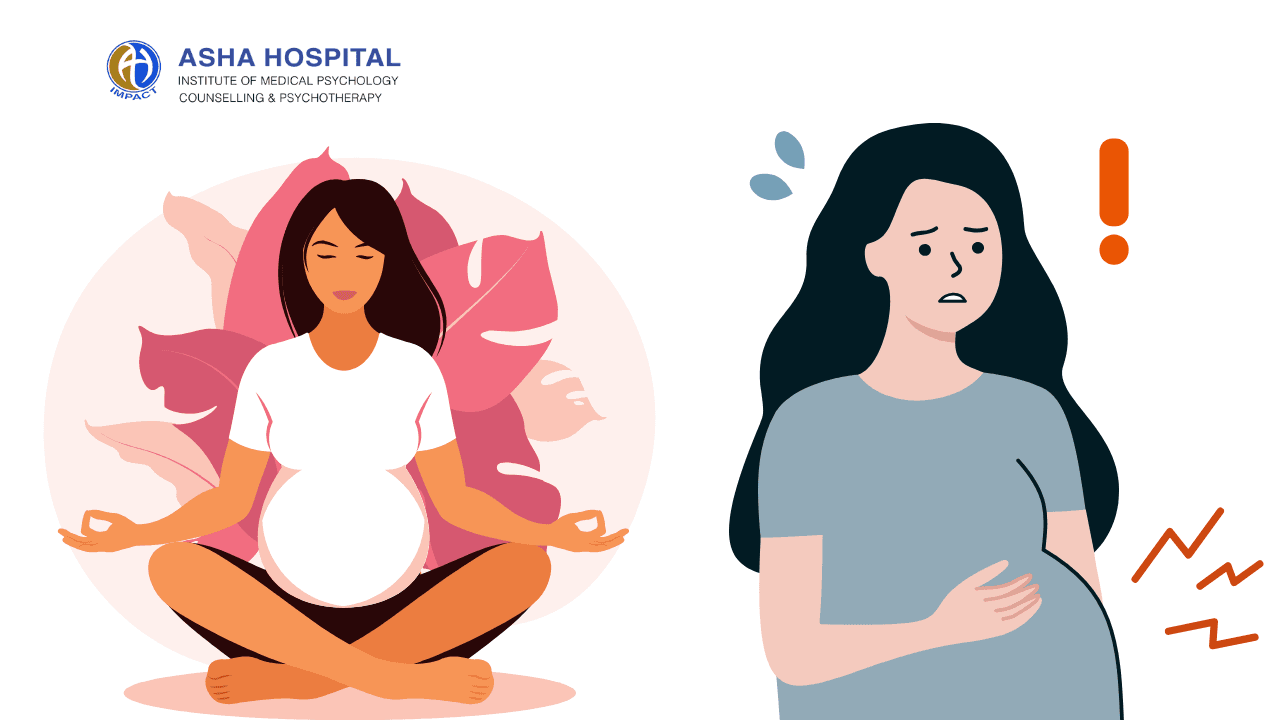Pregnancy is often a very happy and exciting time. But not every woman feels this way.
You may have mixed, or even negative feelings about being pregnant especially when the pregnancy is perceived as “unwanted” or if it is unplanned or if you experienced a traumatic pregnancy in the past or witnessed it in your family members. You may find it more difficult than others to cope with the changes and uncertainties which pregnancy brings. Many things can affect how you feel in pregnancy. These include physical symptoms (e.g. morning sickness), the support you have (or don’t have), and current and past stressful events in your life.

Make yourself familiar with the commonly used terms:
- Perinatal means around the timing of birth, it is a period which spans from your day of conception to a year after your delivery.
- Antenatal refers to the period of your pregnancy right from the day of conception.
- Postnatal refers to the period after the birth of your child till a year.
Women often worry about how they will cope with pregnancy or having a baby. It’s normal to feel stressed or anxious at times. When you are pregnant, it is common to worry about:
- The changes in your role (becoming a mother, stopping work).
- Whether you will be a good parent.
- The changes in your relationships.
- Fear that there will be problems with the pregnancy or the baby.
- Physical health problems and pregnancy complications.
- Fear of childbirth.
- Lack of support and being alone.
As many as 1 in 5 women have mental health problems in pregnancy or after birth.
It can happen to anyone. Depression and anxiety are the most common mental health problems in pregnancy. These affect about 10 to 15 out of every 100 pregnant women. Just like at other times in life, you can have many different types of mental illness and the severity can vary. You may already have had a mental illness when you became pregnant.
Mental health problems you have had in the past can be worrying because they can increase the risk of becoming unwell, particularly after birth. However, with the right help this can often be prevented. You can also develop mental health problems for the first time in pregnancy or after birth.
What are the kinds of perinatal mental health problems we need to be aware of?
- Perinatal depression
- Perinatal anxiety
- Perinatal OCD
- Perinatal psychosis
- Perinatal Grief
How your mental health is affected during pregnancy depends on many things.
These include:
- If you were previously diagnosed with mental illness.
- Stopping medication for a mental health problem – you have a high risk of relapse if you stop medication abruptly when you conceive. This is more likely if you have had a severe illness, several episodes of illness or a recent episode.
- Family history of mental disorders
- Recent stressful events in your life (such as a death in the family or a relationship ending).
- How you feel about your pregnancy – you may or may not be happy about being pregnant.
- Symptoms of mental illness in pregnancy are similar to symptoms you have at other times, but predominantly women can experience distressing thoughts and feelings revolving around their pregnancy
What if I had mental health problems in the past, and I am well now?
You should be referred to a Perinatal Psychiatrist if you are pregnant and have ever had:
- A serious mental illness, like schizophrenia, bipolar disorder, Obsessive compulsive disorder or severe depression.
- If you had experienced depression and anxiety exclusively during your previous pregnancy or during postpartum periods
- It is important to get specialist advice even if you are well during this pregnancy. Women who have had these illnesses have a high risk of becoming unwell during pregnancy or after birth.
- A perinatal mental health specialist’s advise is beneficial to discuss care and treatment choices with you. They will help you make a plan for your care, with your obstetrician, pediatrician and radiologist.
What else can I do to keep my mental health well?
- Eat a healthy, balanced diet.
- You should stop smoking and drinking alcohol (you may need to meet deadditcion specialist to help you with this).
- Find some time each week to do something which you enjoy, improves your mood or helps you to relax.
- Learn and practice meditation or mindfulness
- Let family and friends help you with housework, shopping etc.
- Perinatal yoga can help you with managing mild anxiety and fatigue
- Discuss any worries you may have with your family, your obstetrician and psychiatrist
- Get regular sleep.
What happens if I don’t care for my mental wellbeing?
- You might not take good care of yourself.
- You might not attend appointments with your doctor– so you don’t get the care you need.
- If you use drugs and alcohol, you may use more when unwell. This can harm your unborn baby.
- You may need a higher dose of medication if you become ill. Sometimes you may need two or more medications to treat a relapse. This might be more risky for your unborn baby than if you take a standard dose of medication throughout pregnancy.
- You may need in-patient treatment.
- You may still be unwell when your baby is born. You may then find it more difficult to care for your baby. It may also affect your relationship with your baby.
- If your illness is not treated, this may be more harmful for your baby than the effect of medication. Untreated mental illness can cause a number of problems. For example, some research studies have found babies are more likely to have low birth weight if their mother has depression in pregnancy.
- Untreated mental illness can also affect a baby’s development later on.
Can your partners be affected with perinatal mental health problems?
- Yes, research states that one in 5 men can develop depression after they attain their parenthood
- If you are a young parents with no perceived or actual social support
- If you are struggling with financial, occupational stressors or having marital stress
- You also might find it difficult to handle extra chores and responsibilities in your house, financial pressures and coping with your partner who is having mental health issues
- Partners can be benefitted by reporting their symptoms to perinatal mental health specialists to seek further guidance.
What can your partner do to help himself to cope with his perinatal mental health issues?
- Maintaining regular sleep and wake timings
- Taking good nutrition
- Managing work life balancing
- Having “me time” to help himself to cope with regular stressors
- Meditation and mindfulness
- Enrolling himself into self help, community based fathers’ parenthood groups.
- Meet the perinatal Psychiatrist to deal with your mental health issues
Why Choose Asha Women’s Mental Health Clinic for General Mental Wellbeing in Pregnancy?
Pregnancy is a time of change—physically, emotionally, and mentally. At Asha Women’s Mental Health Clinic in Hyderabad, we specialize in supporting women through these emotional transitions with expert care tailored to each stage of pregnancy.
Our multidisciplinary team of psychiatrists, psychologists, and counselors is experienced in treating anxiety, mood swings, and stress-related issues that commonly arise during pregnancy. We offer personalized therapy, psychiatric evaluations, and wellness support in a safe and non-judgmental space.
With a compassionate, women-centered approach, Asha Clinic ensures that every mother receives the mental health care she needs for a healthy pregnancy and emotional wellbeing. Choose Asha for trusted, holistic support—because your mental health matters as much as your physical health during pregnancy.
Asha Womens Mental Health Clinic – Visit HereFAQ – General Mental Wellbeing In Pregnancy
Is it normal to feel anxious or overwhelmed during pregnancy?
Yes, it’s common for women to experience anxiety, stress, or mixed emotions during pregnancy. Factors like hormonal changes, physical discomfort, lack of support, or past traumatic experiences can contribute to these feelings. Recognizing these emotions and seeking support can help manage them effectively.
What is the difference between antenatal, perinatal, and postnatal periods?
- Antenatal: The period during pregnancy, from conception to birth.
- Perinatal: The time frame around birth, including pregnancy and up to one year postpartum.
- Postnatal: The period after childbirth, lasting up to one year.
Understanding these terms helps in identifying and addressing mental health needs specific to each stage.
What factors can affect my mental wellbeing during pregnancy?
Several factors can influence mental health during pregnancy, including:
- Physical symptoms like morning sickness
- Unplanned or unwanted pregnancy
- Lack of social or familial support
- Past traumatic experiences
- Stressful life events
Being aware of these factors can help in seeking timely support and care.
When should I seek professional help for mental health during pregnancy?
If feelings of sadness, anxiety, or stress become overwhelming or interfere with daily life, it’s important to seek professional help. Early intervention can lead to better outcomes for both mother and baby.
How can Asha Hospital support my mental health during pregnancy?
Asha Hospital offers specialized care for women’s mental health during pregnancy, including:
- Expert counseling services
- Psychiatric evaluations
- Personalized treatment plans
- Support groups and therapy sessions
Our team is dedicated to providing compassionate and comprehensive care to support you through every stage of pregnancy.


